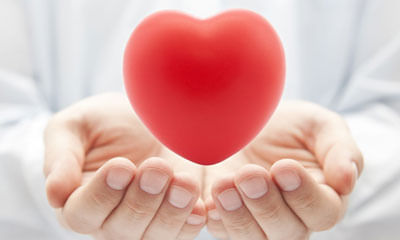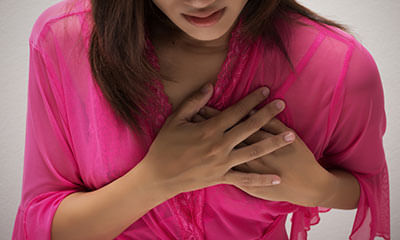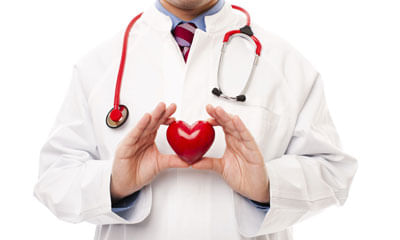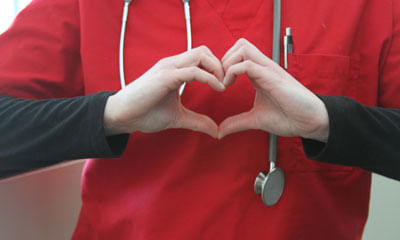Medicine For Supraventricular Tachycardia
I have an eight year old son who has supraventricular tachycardia and Wolff Parkinson White syndrome, he takes 50 mg of ...
Ask Free Question
This was another bout of PSVT. Body temperature is not much connected with these episodes. Some adjustment of medicines is probably required.
My father 65 years diagnosed with PSVT. cardiologist advised trivolib 2 mg and start trio in morning. At night embeta xr ...
Ask Free Question
These medicines are too many, he may feel worse after medicines. PSVT is a benign problem, it should be treated with one simple tablet taken once daily.
I want to know about these issue I am going through, its related to my left chest or may be heart. Usually I have a norm ...
Ask Free Question
Homoeopathy is wonderful in treating such chronic, repetitive complaints More details like your family history, past history, thermals, thirst, desires aversions, attitudes is required to make a prescription especially in a chronic case such as yours. Consult in private with the above details. More questions may be asked if required. Palpitation can be attributed to one of four main causes: Extra-cardiac stimulation of the sympathetic nervous system (inappropriate stimulation of the sympathetic nervous system, particularly the vagus nerve, (which innervates the heart), can be caused by anxiety and stress due to acute or chronic elevations in glucocorticoids and catecholamines. Gastrointestinal distress such as bloating or indigestion, along with muscular imbalances and poor posture, can also irritate the vagus nerve causing palpitations) Sympathetic overdrive (panic disorders, low blood sugar, hypoxia, antihistamines (i.e. levocetirizine), low red blood cell count, heart failure, mitral valve prolapse).[4] Hyperdynamic circulation (valvular incompetence, thyrotoxicosis, hypercapnia, high body temperature, low red blood cell count, pregnancy). Abnormal heart rhythms (ectopic beat, premature atrial contraction, junctional escape beat, premature ventricular contraction, atrial fibrillation, supraventricular tachycardia, ventricular tachycardia, ventricular fibrillation, heart block). Anxiety and stress Anxiety and stress elevate the body's level of cortisol and adrenaline, which in turn can interfere with the normal functioning of the parasympathetic nervous system resulting in overstimulation of the vagus nerve.[5] Vagus nerve induced palpitation is felt as a thud, a hollow fluttery sensation, or a skipped beat, depending on at what point during the heart's normal rhythm the vagus nerve fires. In many cases, the anxiety and panic of experiencing palpitations causes a sufferer to experience further anxiety and increased vagus nerve stimulation. The link between anxiety and palpitation may also explain why many panic attacks involve an impending sense of cardiac arrest. Similarly, physical and mental stress may contribute to the occurrence of palpitation, possibly due to the depletion of certain micronutrients involved in maintaining healthy psychological and physiological function.[6] Gastrointestinal bloating, indigestion and hiccups have also been associated with overstimulation of the vagus nerve causing palpitations, due to branches of the vagus nerve innervating the GI tract, diaphragm, and lungs. FOR MEDICATION CONSULT ONLINE IN PRIVATE
Hi Sir, My blood pressure and heartbeat is high from past 4 days which cause headache problem. Suggest me the reason ple ...
Ask Free Question
Fast heart beating has many reasons. Excess coffee, tea, cough or chest medicines, stress, anemia, fever. Exclude these, Meet a physician if symptoms persist. Best wishes.
My mother is 82 years old and is suffering from supra ventricular tachycardia. She is taking 1 tab calaptin 120 mg SR an ...
Ask Free Question
Palpitations or increased heart beat are feelings or sensations that your heart is pounding or racing. They can be felt in your chest, throat, or neck. You may Have an unpleasant awareness of your own heartbeat or may Feel like your heart skipped or stopped beats The heart's rhythm may be normal or abnormal when you have palpitations. Normally the heart beats 60 to 100 times per minute. The rate may drop below 60 beats per minute in people who exercise routinely or take medicines that slow the heart. If your heart rate is fast (over 100 beats per minute), this is called tachycardia. A heart rate slower than 60 is called bradycardia. An occasional extra heartbeat is known as extrasystole. Sinus tachycardia is a normal increase in the heart rate. How it happens - The sinoatrial (SA) node - the heart's natural pacemaker - sends out electrical signals faster than usual. The heart rate is fast, but the heart beats properly. Causes of sinus tachycardia - A rapid heartbeat may be your body's response to common conditions such as: Fever Anxiety Some medicinal and street drugs Severe emotional distress Fright Strenuous exercise Other causes but less commonly, it may indicate: Anemia (low blood count) Increased thyroid activity Heart muscle damage from heart attack or heart failure Hemorrhage (severe bleeding) You may be having Palpitations, which are feelings or sensations that your heart is pounding or racing. They can be felt in your chest, throat, or neck. You may Have an unpleasant awareness of your own heartbeat or may Feel like your heart skipped or stopped beats The heart's rhythm may be normal or abnormal when you have palpitations. Palpitations are not serious most of the time. Sensations representing an abnormal heart rhythm (arrhythmia) may be more serious. Your doctor should consider and treat the cause of sinus tachycardia rather than the condition itself. If your rapid heartbeat is a symptom of a more serious or longer term problem, simply slowing the heart rate without checking for underlying reasons could cause more harm because you are leave the underlying condition untreated. You need to get yourself checked what you may be having is intermittent tachycardia / arrhythmia which means that intermittently your heart rate increases or the heart Rhythm changes which can be dangerous if it does not get corrected on its own. Or it can be an early sign of impending heart disease. But to diagnose it you need to get an ECG done while you are having the rhythm problem or you can get holter monitoring for 24 hours during which if you have this episode it will get registered and documented. Also you need to get a complete lipid profile done as well as a echocardiogram and blood sugar and thyroid levels to look for risk factors. Once you have done that Get back to me with the reports for a detailed consultation.
What does it mean to be tachycardia on the monitor I keep getting this advice from my doctor however it is a nurse that ...
Ask Free Question
Tachycardia means fast heart beating. Very commonly caused by nervousness when one meets a doctor. Ask nurse what is the heart rate? Up to 120 beats per minute is common when person is nervous. Second possibility is one of your medicines may lead to ingress in heart rate, check about this with your doctor. Best wishes.
Hi my moms age is 58 years she is suffering from PSVT heart from past 5 or 6 years and taking Seloken Xl 50 mg every day ...
Ask Free Question
For paroxysmal supraventricular tachycardia you need to consult a cardiologist who have is an ep specialist. So far as angiography goes conventional angiography gives the final answer. Ct angiography is more of a screening test. If the heart is'weakening' better to go for conventional angiography to check if any vessels are blocked. In delhi all good centres like medanta, fortis escorts and aiims have the required facilities.





